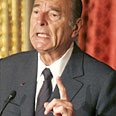
France warns: Nukes in response to terror
Unprecedented threat: French President Chirac threatens nuclear response to terror attack on French soil. German intelligence: Iran 3-4 years away from acquiring nuclear bomb
France said on Thursday it would be ready to launch a targeted nuclear strike against any state that carried out a terrorist attack on French soil.
In a speech defending France's costly nuclear deterrent and toughening policy against terrorism, President Jacques Chirac said Paris must be able to hit back hard at a hostile state's centers of power and its "capacity to act".
"The leaders of states who would use terrorist means against us, as well as those who would consider using in one way or another weapons of mass destruction, must understand that they would lay themselves open to a firm and adapted response on our part," Chirac said during a visit to northwestern France, where France's nuclear submarines are based.
"This response could be a conventional one. It could also be of a different kind."
Chirac said all of France's nuclear forces had been configured with this strategy in mind and the number of nuclear warheads on French nuclear submarines had been reduced to allow targeted strikes.
It was the first time he had so clearly linked the threat of a nuclear response to a terrorist attack, but he made no mention of any specific threat against France.
"Against a regional power, our choice would not be between inaction or annihilation," he said.
"The flexibility and reactivity of our strategic forces would enable us to exercise our response directly against its centers of power and its capacity to act."
Iranian threat
Meanwhile, Germany's foreign intelligence agency believes that Iran is at least three or four years away from getting a nuclear weapon if it wants one, a source familiar with the agency's estimate said on Thursday.
"Our guys believe the minimum scenario is three to four years. Our allies in Tel Aviv and the U.S also believe it would take quite a few years," a source familiar with the views of the BND intelligence agency told Reuters on condition of anonymity.
Iran says it only wants nuclear technology for an atomic energy program to meet booming demand for electricity in the Islamic republic. The United States, the European Union and many other countries believe Tehran is covertly developing the bomb.
The BND was not immediately available for comment.
Israel, which Iran's president has said should be "wiped off the map", believes the earliest Iran could get an atomic weapon is 2008. The United States believes Iran could get the bomb in the next decade.
The director general of the U.N.'s International Atomic Energy Agency (IAEA), Mohamed ElBaradei, said Iran could have a weapon within months once it gets the nuclear fuel for it.
"If they have the nuclear material and they have a parallel weaponization program along the way, they are really not very far – a few months – from a weapon," he told Newsweek.
But it is getting the highly enriched nuclear material that the BND and other experts believe is Iran's biggest obstacle.
The BND's estimate is consistent with one released last week by David Albright and Corey Hinderstein of the Institute for Science and International Security, a U.S. think-tank.
Albright, a former U.N. Weapons inspector, and Hinderstein said Iran could not get a weapon before 2009, because it has not mastered the art of uranium enrichment.
Tehran has announced plans to resume "Research and development" on uranium enrichment, a process of purifying uranium for use as fuel for power plants or weapons. In response, the EU and United States have called for Iran to be hauled before the U.N. Security Council for possible sanctions.
Albright and Hinderstein said that if Iran wanted an atom bomb, predicting when it could have one would depend on the number of working enrichment centrifuges in Iran. Centrifuges enrich uranium by spinning at supersonic speeds.
They said Iran could have 1,300-1,600 centrifuges by late 2006, which would be enough to begin producing bomb fuel. Tehran would then need another year to install and test them.
"Given another year to make enough HEU (highly enriched uranium) for a nuclear weapon and a few more months to convert the uranium into weapons components, Iran could have its first nuclear weapon in 2009.
"By this time Iran is assessed to have had sufficient time to prepare the other components of a nuclear weapon, although the weapon may not be deliverable by a ballistic missile."










